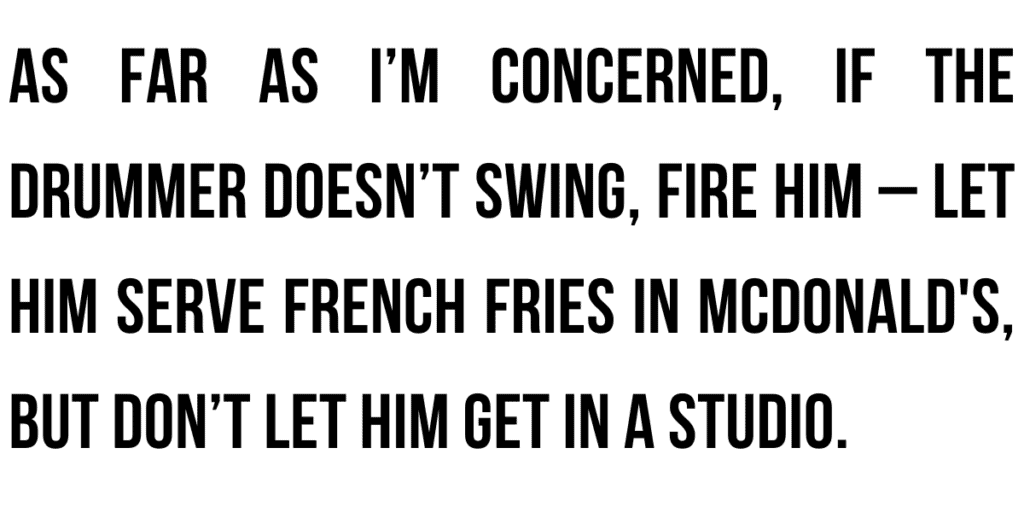Bass session legend Leland Sklar, who has worked with a variety of big names over the years, recently addressed some of the issues that he notices with musicians today. Speaking to Bass Player, Sklar first looked back at his work before getting to the said point, by offering:
“When I got into the studio scene, I found myself getting all kinds of calls. One minute I’m doing Helen Reddy’s ‘I Am Woman,’ and the next thing I know I’m doing ‘Spectrum’ with Billy Cobham. The calls would come in and I’d look at everything as a challenge.”
To those who may not know, Sklar has participated in so many studio sessions over the years that it’s difficult to count. There’s literally no point in listing all of the works here since you’d just end up scrolling for hours.
Further pressed on how things have changed after his fifty years in the industry, Sklar pointed out that technology can be both an ally and a nemesis. In particular, he addressed some of the singers, engineers dealing with said singers, and, most importantly, drummers who don’t “swing.” He said:
“Firstly, I’m all in favor of technology – I don’t want to be living in the stone age – but with Pro-Tools and such like, you’ve got singers that can’t sing to save their lives and engineers whose whole careers are spent tuning bad singers.”
“You’ve got a drummer with no time, so you move the beat. As far as I’m concerned, if the drummer doesn’t swing, fire him – let him serve French fries in McDonald’s, but don’t let him get in a studio.”

Yeah, that seems like a very harsh thing to say. However, if it’s coming from someone of Sklar’s reputation, it has more weight. Discussing the issue, the bassist also added that, despite the use of modern technology, he still loves to go back to doing things the old-school way. Leland continued:
“Every once in a while I work on things and I feel like I’m in the old days. We got so used to that – going into sessions with Jim Gordon or Jim Keltner and the pocket was so strong!“
“Everything was based on ensemble playing, whereas nowadays, at least half the work I do, I’m just overdubbing to sequenced bass and they want it to feel natural, but you’re already handcuffed by the fact that this was done to a sequencer!”
But what Sklar also adds is that it’s not just the technology that could make things sound sterile but the methods that we use it as well. As he explained:
“They want you to make the track breath a little bit. I often think: ‘Why don’t they just put a real rhythm section together?’”
“People want to keep as much control and money as they can, and they are afraid to let a bunch of guys come in and actually play something. I’ve made records that way and suddenly we’ll do a gig and the first time the band plays the song it’s 100 times better than the record and they’re wondering why! It’s because we’re all putting personality into the tunes.”
When asked how he comes up with bass parts after so many years and so many sessions, Sklar replied:
“The one thing I’ve cultivated is a real sensitivity to singer/songwriters. I know how to accompany, and how to listen to a person breathe to hear where the downbeat is – to never try to lead them. I’m really comfortable on that seat.”
He also adds:
“Guys get so used to ‘time’ that they don’t really understand that you can have a beautiful pause before a verse, because you’re human! Don’t do all your training with a metronome, try to understand what it is to really feel a song. Don’t be afraid to leave that kind of space. I often get hired because the artist feels comfortable with the extra room.”
Leland Sklar is one of the guys who you’ve most likely heard so many times without even knowing who’s playing bass on the song. And with such a prolific session musician, it’s safe to say that he has dealt with countless producers over the years. And for this purpose, one would need a so-called “producer switch” on their instrument.
As Sklar revealed in a video interview that recently went viral, the switch does absolutely nothing. It’s just there to deal with those producers who constantly bother musicians how they should change their tone. Sklar just flips the switch and, funnily enough, producers like the tone better. Sklar said:
“I call it my producer’s switch. If I’m on a session and the producer asks me to get a different sound, I make sure he sees me flip this switch and then I just change my hand position a bit. There are no wires of anything that go to this switch. It’s a placebo, but it’s saved me a lot of grief in the studio.”
Photo: Magnushk (Leland Sklar August 2007), StockSnap (French Fries)


